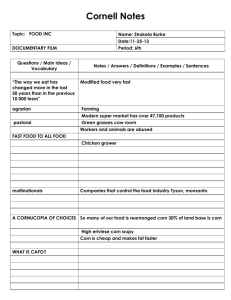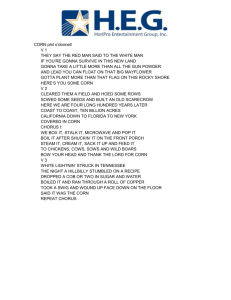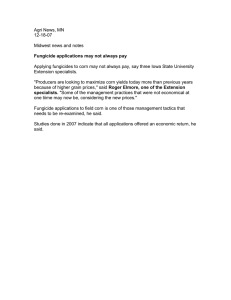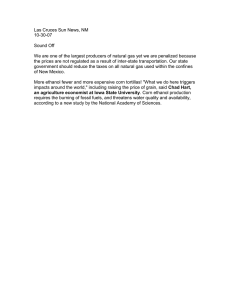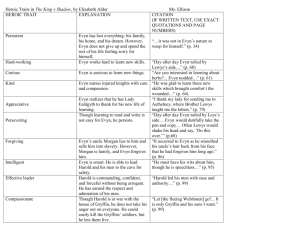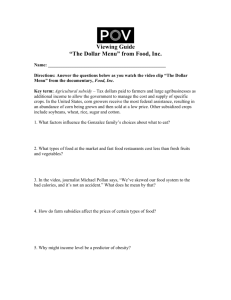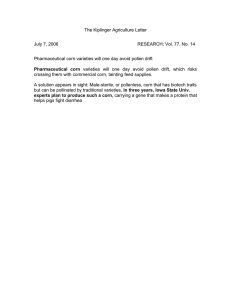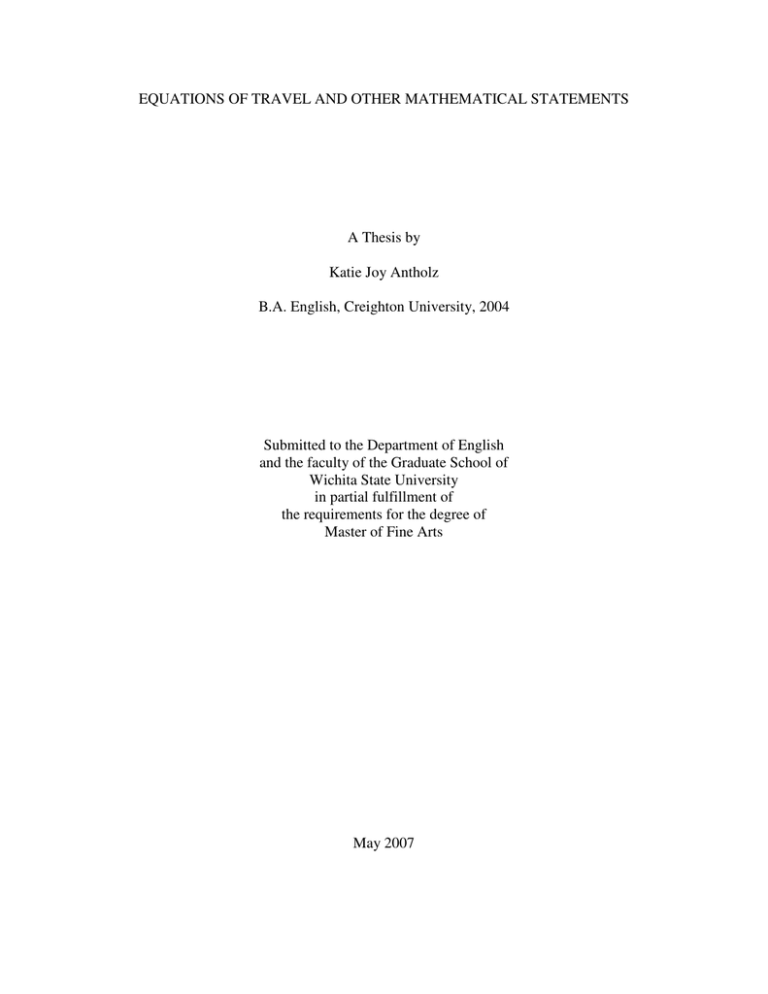
EQUATIONS OF TRAVEL AND OTHER MATHEMATICAL STATEMENTS
A Thesis by
Katie Joy Antholz
B.A. English, Creighton University, 2004
Submitted to the Department of English
and the faculty of the Graduate School of
Wichita State University
in partial fulfillment of
the requirements for the degree of
Master of Fine Arts
May 2007
Copyright 2007 by Katie Joy Antholz
All Rights Reserved
EQUATIONS OF TRAVEL AND OTHER MATHEMATICAL STATEMENTS
I have examined the final copy of this thesis for form and content and recommend that it be
accepted in partial fulfillment of the requirement for the degree of Master of Fine Arts with a
major in Creative Writing.
__________________________________
Albert Goldbarth, Committee Chair
We have read this thesis and recommend
its acceptance:
__________________________________
Rick Mulkey, Committee Member
__________________________________
Diane Quantic, Committee Member
iii
ACKNOWLEDGMENTS
Thanks to Albert Goldbarth for his often amusing, frequently sardonic, but always
illuminating commentary and presentations on poetry. I am also grateful to my family,
especially Mom and Grandma, for their continuing support. But most of all, I wish to thank
Gretie, my favorite sister, for always being willing to explore the hokier side of life, even when
she’s wearing stilettos.
iv
TABLE OF CONTENTS
Part I: Roadside Curiosities and Other Variables
1
Nut Museum, Old Lyme, IA
2
Shoe Tree, Middle Gate, NM
3
Ole’s Big Game Bar, Paxton, NE
4
Drive-Thru Zoo Experience, Ashland, IA
5
Postcards, Winslow, AZ
6
Mike the Headless Chicken, Fruita, CO
8
Carhenge, Alliance, NE
9
Corn Palace, Mitchell, SD
10
Mile 48, Muskogee Turnpike, OK
11
Pioneer Village, Minden, NE
12
Indian Cave State Park, Scribs, NE
14
Big Muskie, Cumberland, OH
15
Human Body Slices, Chicago, IL
16
Edgerton Explorit Center, Aurora, NE
17
I-Hop, I-40, AR
18
Tarmac, Phoenix, AZ
19
Dinosaur World, Eureka, AR
20
Glore Museum, St. Joseph, MO
22
Miles 128-179, I-335, KS
23
Back Cover, EZ-Does-It Guide to America
24
v
Part II: Usual States and Other Constants
25
Harvest Miners
26
Fix
28
Four Women Behold Snow
29
po⋅ta⋅to
31
The History of Our Women
33
Shock
34
Garden Ghosts
35
Changing Hands
36
In that space before sleep
37
To the Far Away
38
Father What a Waste
40
To My Pink Strappy Heels
41
Upon Their Second Date
42
Laws of Motion
43
Genealogy of Affection
44
Real Numbers
45
vi
PART I:
ROADSIDE CURIOSITIES AND OTHER VARIABLES
1
Nut Museum, Old Lyme, IA
Nuts are fresh tokens of primeval existence
-The Nut Lady
I. Nut Taxonomy
The nut is simply a stony ovary, a malleable fruit
membrane that once cased a single seed
desiccated into an impliable wall.
Thus, the almond starts green, the fuzzed drupe
fissures, the corrugated nut emerges,
a purple-black robe encapsulates the pili’s
oil-rich, triangular form,
blond and crimson catkins prelude
tubular husks that encase the filbert,
the sweet chestnut’s chocolate frame
pokes through a chasm in its spiked hull,
panicles mature into cuspidate ellipsoids
that encase lustrous conkers—
These variants, hybrids, diversifications—
a redolent bouquet of mutating alleles— still
only a seed in ever-reconfiguring guise.
II. Nut Evolution
Hundreds of nuts
evolved when only
moments after Adam’s teeth first
seized the fruit,
his lips withdrew
from the concolorous meat, pursed,
and quickly ejected
a glossy, oblong seed.
2
Shoe Tree, Middle Gate, NM
Started in 1994: a belligerent bride threw her groom’s sneakers into the tree after a fight
regarding said footwear (forgetting dress shoes at home, he encased his tennies in black
electrical tape). Middle Gate’s own embodiment of American Highway Spirit, the shoe tree
blossoms with polymer beauty.
-Pamphlet from the Middle Gate DQ
We gaze at the eternally bound pairs—
knots in the laces soldered by wind-blown sand,
cycled through rain-soak and desert-bake, ponder the plywood sign
Shoes are tattletales—
they leak your secrets—choose
wisely for your hooves.
I propose a revision: If shoes expose
our momentary selves, then where our shoes go
to age sing the arias of our souls.
The rubbers of my Reeboks once rhythmically groaned through three
pointers and foul shots as well as the boys’ captain’s
backseat; now, under my mother’s
azalea bed where I, hating the confining lips
of their high-top ridges, buried them—they decompose,
keen the end of childhood.
Patent espadrilles used to croon
my panache, my craving for a suggestive stroke
upon my hip; now, casualties
of an abysmal break-up, they dwell in an ex’s
basement and chant the chorus of my fear of commitment.
Custom-dyed lilac stilettos serenaded down the aisle
by the best man’s spats now approach
a decade behind my winter boots,
perform a quick cabaletta: my fear of letting go.
Here at this shoe tree, scores of shoelaces hitched
to the cottonwood’s fissured limbs, I witness
Vans, Pumas, Nikes, Filas—a chorus
of fading leather, rubber, nylon, canvas—troll spontaneity.
I turn to search for the camera from the backseat and find you
cinching the knot in your old Chuck Taylors.
3
Ole’s Big Game Bar, Paxton, NE
“If beer were a woman,” you say, “she would
be doing lap dances for us tonight.”
You are past the point of comprehensibility,
but here in this paradoxical bastion
of booze and shooters, where elephant
heads and ibex prongs materialize along the log walls
that keep out Nebraska wind, heavy with sand and chaff,
I ignore your inanity.
If it weren’t for the row
of rednecks in Husker shirts who grumble about water
rights and Ogallala’s shrinking,
we might as well be in the Smithsonian
wing dedicated to Roosevelt’s post-presidential quests
with big game rifle— looking down on us,
a cape buffalo, moose, lion, elk—some 200 assorted mounts—
a menagerie in this watering hole, immobile giants
marooned on Ole’s wood-floored island,
isolated from the undulating dunes that teem
with life comparatively miniature: rabbit,
prairie dog, bull snake, occasional coyote.
We scan the plaque above the door as we tumble
into the clear night: Ole unlocked these doors
for drinkers all around at 12:01 a.m. on August 9, 1933.
Another oddity. “Senseless,” I swear.
You pause your gambol around the stuffed polar bear
whose feet are anchored onto the warm sidewalk:
“Prohibition ended on August 8th.” Then I remember
that the panhandle sands ensconce bones of wooly mammoths,
and just east at Ashfall, camels, rhino and saber-toothed deer
sleep beneath wind-rippled soil.
“It’s 12:12,” you swagger, “Kiss me.” My hand flattens against
your chest to push you away, but then I see, for the moment,
my suspended arm as a trophy of my acrimony.
I gather my spread fingers, clench your shirt and pull you
forward until your lips meet mine.
4
Drive-Thru Zoo Experience, Ashland, IA
Today’s Notices: The miniature deer are currently on vacation,
and the ibex has been permanently removed from our exhibit due
to climatological issues.
Please abide by these ten rules throughout your visit:
1) Keep vehicle on road at all times.
2) View animals from vehicle only; if you do need to leave the vehicle, stay within sprinting
distance of your vehicle or other shelter.
3) The park is not responsible for any damage done to vehicles as a result of delinquent animals.
4) Keep small children at bay.
5) Do not allow animals to enter your car and leave the park with you. Do not kidnap animals or
steal any of their effects.
6) If animals approach vehicle, do not be alarmed. If animals attack vehicle, do not be alarmed.
If an animal attacks your vehicle in such a way that a window is broken, or access to the
inside of the car is otherwise gained, please notify the park station by proceeding to the
nearest emergency phone (located at four different points along the route). Do not attempt to
remove animal from car; improper disruption of animal behavior can seriously impact that
animal’s habits, including eating and mating. Therefore, wait for the assistance of a park
employee.
7) Do not leave any trash behind. Peeing on trees is not allowed for visitors; restrooms are
located at the south end of the walk-around prairie dog colony exhibit.
8) The moose do bite.
9) Do not allow appendages to wander outside of vehicle during the moose exhibition (miles 811 of the tour). Errant limbs are discouraged at all times.
10) No modified mufflers, raucous stereos or other loud noises. Excessive noise affects the
mating behavior of the resident beaver colony.
IMPORTANT NOTICE TO VISITORS: If you visited the park at any point during 1983, you
should notify the office immediately, as they have important information that may dramatically
affect your health.
Enjoy your drive. Seatbelts = safety.
5
Postcards, Winslow, AZ
Gloria:
The canyon sucked.
Glorified hole.
Petrified forest?
Everybody needs wood
that’s stoned. When the shit
will Dad get sick of this?
I hate this damn trip—
Rob
Terry,
I suppose you’re out getting a $100
hamburger since it’s Saturday—fly-day.
Walked barefoot on Route 66 so I could truly feel it—
my feet molding to the every curve,
pock that decades of travelers
have sketched into this asphalt
canvas. Warm, the 2:00 a.m. stars faint
through the lights of Winslow, I could
almost feel its heartbeat. Kisses,
Analese
Jim: You better be doing the dishes as I explained;
the Fiesta does not go in the dishwasher. Clothes—
do not attempt to wash your polyesters; wait until I
come back and can properly pretreat. Don’t be lazy
about mowing. Do it Sunday, then water. Feed Dee
a full can of food in the morning, half 9:00 at night.
Saw the painted desert and a canyon. Nice. Love,
Abigail
Harriet,
Enjoying the bondage
convention. Many new products—
neon packing tape, reusable labels—
could take the business
to the next level.
Saw the canyon.
How many packing peanuts
could fill that sucker?
Steve
6
Mary:
Almost drop-kicked
a Baptist into the canyon
when he knocked
my Jesus was a Dancer
t-shirt. Grabbed a lady
from our Holy
Rollers tour group,
did meringue
behind the Baptist’s van
so he couldn’t leave.
Power to Catholic
Salsa Dancers,
Mark
Mick:
I miss you more than
the number of dead armadillos
we’ve seen along the road.
(And believe me, it’s a lot)
I will be seeing you a fewer
number of days than
the number of towns we’ve
passed in the last hundred
miles that didn’t have
an Indian taco stand. Hugs,
Jenny
Trish:
Sex with truckers—
well, you know.
Will find another
way to thumb.
Lisa
7
Mike the Headless Chicken, Fruita, CO
Lunch crumbs—crusty chicken sammies,
Lola’s Lucky Eats Monday special (really
just the Sunday special leftovers stamped into patties)— commune
in the folds of your shirt, which proclaims, I’ve been in the Hole
N’ the Rock in Moab. You slide a pickle
from your half-eaten sandwich, position it on your tongue,
cross yourself thrice, swallow,
cry, “Bless me, headless
Mike, for my impure thoughts of fried chicken.”
Across the street, Mike’s
effigy, formed from implements donated by mourning
farmfolk: harrow claws, scissors
and seven variously sized axeblades, rusts,
an assembly of keen edges dulled by weather.
If Lloyd had never created Mike,
breeding his buxom Bard Rock and Garven’s rooster,
had never adulated Mike
as the perfect, flawless, centerpiece of his wife’s Memorial Day dinner,
if his knife had been a centimeter
lower, if the brilliant design
of mashed chick feed sucked up an eyedropper
hadn’t occurred and he hadn’t suckled
that chicken for damn near two years,
we might still be lost
in Wyoming, searching for the giant jackalope.
Lola tells us that the dessert special is rhubarb pie. We order one;
we’ll cut it in half.
8
Carhenge, Alliance, NE
The church ladies gossiped, “The devil’s
made him crazy.”
His wife swore, “That son
a’ bitch better not do it.”
The coffee-shop congregation
claimed, “Government project—water testing.
‘Crats gonna take away water rights, suck canals dry.”
All that when Jim only started to dig a cryptic
arrangement of massive holes.
Then cars resurrected from junkyards, raised,
back-ends buried, engine blocks communing
with sky. Vertical Cadillacs, upright Chevrolets
inspired more speculation:
Ten decaf drinkers suspected
conspiracy, “It’s a portal for the Repub’s to hide
nuclear waste out here.” Two regular drinkers
blamed his mother: “Never was right that woman hung
them nude paintings in her living room.”
Jim’s wife
eyed the ’69 Fairlane which became the heelstone.
“That bastard; that’s the car he and that hussie
Tammy Riley used to run in.” She cursed
the site, ritualistically avoided the east
side of the farm where the cars rose up
along the horizon.
The church ladies shuddered
at the alignment, “The devil must have initiated
this calculated mass of trunks and treads; evil has dwelled.”
While everyone prattles on, the cars conceal the mysteries,
like the ’91 Lumina driven for years by the old couple
Rasumussen: she to bingo, he to deliver fall turnips
to neighbors. She stashed her winnings beneath the seat, he hid
his pay in the glove box. Neither spent the cash,
saved it for needy days, kept building the treasure
until the day they drove the ’91 into a snow bank;
stuck, they froze to death, purple blossoms prospering
on their limbs.
The money might still be there.
9
Corn Palace, Mitchell, SD
Above this short-storied, flat town,
onion domes and minarets effloresce—
a citadel of fertility, 1,000 bushels of corn,
native grass, grain tight over every inch—
sole glimmer of potency
among sun-beat grassland,
dingy islands of interstate towns.
At the Mustang Motel, you flip through the phonebook
to see how many people have your last name.
When the phone rings, I watch your teeth flicker
behind your lips as you say hello. Then your contours
transition, restyled by articulations streaming
from the phone line: your blonde lashes grow
dewy and grief plows grooves in your forehead.
Suddenly you seem old to me— your crows feet creep
into your temple’s open plains. Unable
to spin a net of words that will break
your fall, I tangle my fingers in the rough
husk of your hand, glide my palm over your back.
But tonight against your landscape, my hands seem small.
10
Mile 48, Muskogee Turnpike, OK
Two a.m. Still drowsy, you hum Merle Haggard, pull me in for a kiss.
The turnpike is silent save infrequent trucks that rush on to morning;
there, beneath that huddling, lone light of the stop,
I run my hands against your highways—
the sleep lines that track from your temple to chin
You ask me where we are and suddenly the cities blur,
the freeways smudge. I forget our story. Perhaps we are running
away, or maybe we are going home. I cannot tell in this night that hides all.
you have told me that Oklahoma is flat, that grass crops up
to shade its homely face, but in this moment I think
that perhaps mountains rise up beyond,
perhaps an ocean beats its surf into cliffs or a jungle spills its tangles eastward.
But I cannot know. You lean against me
and ask for the map.
11
Pioneer Village, Minden, NE
Harold Warp once found a green marble
while he was picking corn with his father. As he plucked
it up, some corn spilled from his sack, and his father yelled,
“Dammit, boy, we ain’t got all day!”
While Harold stared
at the marble in his hand,
he tripped over the spilt corn. His father laughed and kept
chucking corn. Harold thought, “I’d like to get
my hands on more of these marbles,” so he hurled
his sack into the air and walked straight out of that field.
When Harold was older, his father, Harvey Warp,
was the first farmer to get an automated corn
picker. One day the machine plugged,
and while Harvey pulled the glut
of corn from the teeth
of the picker, his forearm mashed into the gears.
The doctor pried it out, sewed the largest pieces
back on, but Harvey died of gangrene
anyway, so Harold inherited the picker
and thought to himself, “Why collect
only marbles when a guy can amass corn
pickers too?” So Harold started hoarding.
Later in life, when Harold declared to his wife,
“I’m delighted I’m going to die
with the largest collection of currycombs, miniature kegs
and Massey Ferguson tractor seats,” she remembered
that she needed to gather eggs and promptly went out
to the chicken shed. The next day she sped off to town
to sell those eggs. As she crossed the Platte, the steering
wheel jerked and pitched the car into the shallow
waters. Nose first, the car flipped, landed top down
in the water, which gurgled up through the vents and bathed
the egg yolk off her unconscious face.
So Harold decided to start
on egg crates. One day he was bidding on a tantalizing lot,
eating a sack of peanuts when a sly, rounded little nut
slipped down his throat. Choking, his body convulsed
into a stack of pitchforks; he narrowly missed
impalement. While the auctioneer begged the audience
for help, Harold stumbled about, hands around
his throat, until his knee hit a box of wrenches, and he tumbled
12
into a pile of scythes, which gashed his forehead,
throat, upper pectorals and right forearm.
Harold bled to death on a carton
of lace handkerchiefs he had been eyeing all morning.
Years later Harold’s great-granddaughter, who inherited
his shot glass collection,
stands at the admissions counter and collects
bills from the family of seven
standing weary-eyed before her. The smallest boy
peers into a case of children’s toys—
jacks, paper dolls, marbles, metal
banks—and, his nose twitching
from dust, sneezes, frosts
the glass with mustard-colored snot.
Harold’s great-granddaughter smiles at the congealed mass
that borders his nose and turns back
to reading one of her magazines.
13
Indian Cave State Park, Scribs, NE
Here before this scallop in the rockface you
scoff, “Cave? Just looks like some lonely
Indian boned the wall.”
Oblivious, you overlook
the fire-burnished ledge,
autography that forms
a blueprint over the hollow.
14
Big Muskie, Cumberland, OH
We expected a leviathan and found
a love letter inscribed on a rusted I-beam:
This giant piece of history
exists only in memory
‘cuz the big cats triumphed.
She excavated twice
the earth of the Panama Canal;
it took only one blast
to fell her. Many gave
money to preserve her;
that was not in vain,
however, for it brought
leagues of people together
in a positive endeavor.
Tonight, somewhere in Midwest, a woman will wish for a love
song, but her farmhand will be in the field cheating
another hundred miles out of his jury-rigged Deere as he hums
to the predictable rhythm of its pistons.
15
Human Body Slices, Chicago, IL
Horizontally deli-sliced into half inch pieces, a man becomes 148 segments, a woman cleaved
from head to toe then shaved into slivers is remodeled into 34. Turning the plastic plates, we
read them like books, observe the thick section of his chin diminish into his neck, scan her
breasts, which accumulate into peaks. Locked in labyrinths of white matter since the 40s, their
synaptic vesicles fade to generic gray; in each, five thousand molecules of neurotransmitter—one
mass of dormant electrical potential.
If their sections were stacked into the shape of bodies again, if these two rose from their separate
volumes and embraced, if her head fell against the thin skin covering his clavicle, the points at
which the lines of their segments would cross would number near five thousand: two bodies,
quiescent for over sixty years, forming a single grid alive with sparks.
16
Edgerton Explorit Center, Aurora, NE
Before Edgerton captured each millisecond
of a bullet piercing an apple, most thought the entry
point of a bullet concave, impacted
surface ruptured and mashed against insides, the exit
pushed beyond convex to an exploded protuberance—
two synonymous formations separated only by matter.
But Edgerton’s camera caught the concave surge
outward: the projectile initiating is own wake
of air and mass, mutating its own entryway.
Two mirrored breaches: the true picture of the slug’s movement,
the certainty in determining its direction of travel irreversibly reduced.
17
I-Hop, I-40, AR
In the motel room, feet tangled in shag carpet,
you perform your nightly ritual, run hands over the face of the map,
let fingers find the way to our next destination.
I have come here to escape, to flee the car, the room,
my bag and its weary contents—the bottle of shampoo whose
label is nearly scratched away, the wifebeater I wear to bed
worn thin and aged from white to gray, the pack of cards
now missing an ace—their scent no longer mine,
but a strange mix of the both of us and fragments of every motel room
and bar and rest stop along the way.
At the counter, a collegian presages six friends: “Sit us somewhere
out of the way. They’ll be drunk and obnoxious.”
A voice admits, “I find myself wanting the good dancer,
to feel his feet against mine, yet I can’t seem to fall into his arms.”
A group of workers: “This meth addict admits
over the phone that he used last night in front of his kids
and tried to get his ten year old to try.”
In front of me to his smudge-faced companion,
“The wells are going dry.”
The group of drunkards arrives, weaves
through tables, eyes stacks of pancakes;
one slurs, “Do they serve those things here?”
From the booth in front of me, again, “The wells are going dry;
if it doesn’t rain we’re done.”
Then a new voice from across the aisle: “It came back.
All it said was return to sender. No forwarding address.”
18
Tarmac, Phoenix, AZ
On the tarmac
two cargo carts
stuffed with white boxes
labeled “Fresh Tropical Fish,”
the virile red ink of
“Live” marked below.
Alone, as that sea of departures
and arrivals swarms
around, the sides of their spheres
grow soft in the sun, close in,
and the water scrapes against their gills.
19
Dinosaur World, Eureka, AR
The Neanderthal woman greets us at the gate,
stucco breasts bare with nipples that point
at her mate, who looks leprous, paint on his face peels,
chunks fall past his six-pack onto his loincloth.
“Do you think he’s got wood
under there?” you grin. “He does get to stare
at boobs all day.”
You grab my hand and lead me through the exhibit;
I affix myself to the park’s pamphlet:
Welcome to Dinosaur World,
founded by one man with an astounding dream:
to show the world the marriage
of evolution and the Bible.
Down the pathway a twelve foot brontosaurus
wrestles with a bloody torso.
After his tour of duty in WWII,
Mr. Joseph Abel found
Jesus but discovered
that the dinosaurs, creatures he learned
about from a war-buddy archaeologist…
A megalosaur’s teats taper to a sharp point;
wait to impale the primate babe that gazes,
lips parted, at their cherry centers
….and Jesus just didn’t seem to mesh.
But after an in-depth biblical study,
he discovered a loophole in Genesis!
Atop a large boulder, another Neanderthal,
head cracked away—presumably male,
judging by his loincloth which grows
to a perfectly globular apogee—
cradles a large tablet.
He then joined dinosaurs and man
together in this stunning Ozark setting.
The local preacher banned him from church,
and his wife left after he started
to build a 15’tyrannosaurus munching
on a nest of Neanderthal babies,
20
a project he later abandoned
in favor of the Uintatherium mating scene,
which is to the sharp right of the entrance.
The mouth mounting Uintatherium—little
more than a stunted giraffe—
hangs slightly open, and blood glazes
his teeth, runs over his jaw.
Beneath him, the female
gazes ahead, her mouth parted
in an unmistakable smile.
May his dream live on
and delight visitors for years to come.
21
Glore Museum, St. Joseph, MO
Ten bucks poorer, we encounter the macabre
devices that could not cure the man who collected
114,245 cigarette packs under delusion
that his efforts would win the ward a new wheelchair
or remedy the one that stuffed 412 yellow slips,
exactly 3x3 behind the TV screen, each inscribed,
calculated penmanship that expressed a solution—
answers to the innumerable questions
posed by psychiatrists
or explain the artistic display of 1446 tiny objects:
453 nails, 42 screws, safety pins,
needles, spoon, salt and pepper shakers,
even a small tin soldier. Sharp and smooth
juxtaposed, all pulled from the patient
with a compulsion to consume.
I contemplate innumerability:
our days together, the miles,
the gravity between our two bodies,
and for the moment revel
in the realization of my uncertainty.
22
Miles 128-179, I-335, KS
“United States Submarine Veterans Memorial Highway.
Why here?” you snicker, “in this state full of lakes
so shallow it wouldn’t take Jesus to walk on water?”
The USS Nautilus, the first to glide beneath the polar ice pack, can dive
300 feet. But here in these Kansas cuestas, at that depth, limestone and shale
would pack against the ballast tanks, freeze the hull in among their layers. Still,
300 million years ago, some mollusk buoyed itself here, then
in death descended to the seafloor and gradually devolved
into calciferous micrograms, an iota on the sheets of rock now beneath us.
You provoke, “Don’t you see the contradiction?”
I turn back to look for another sign
on the southbound side and see that the wake
of concrete out the back window is only water,
gravel, sand, and Portland cement, a modern brand that veils
what is only a jumble of rock and grit seined from ancient seas.
23
Back Cover, EZ-Does-It Guide to America
America remains the greatest travel destination on earth; with its rich cultural and political
history, priceless exhibitions of scientific and intellectual achievement, and accessibility of
unique encounters with inviting locals, no other country can truly compare.
-Fred Faceti, founder of the EZ-Does-It series
Four million miles of routes turnpikes, avenues, yearning for the smooth stroke of your tires on
their polished bellies. Here you can venerate a well-tuned sultan in Memphis, surrender in
Kentucky to a giant crucified sovereign, banquet with the monarch in Miami’s original Burger
King. No dauphins romp under desks in the oval office; this vast dominion is ours! Fifty
states— your history, your legacy—ageless treasure, charm, amusement anticipates your advent.
This guide helps you encounter America fluently: history and culture spreads allow you to
explores museums—from the MOMA to the MOBA—or festivals—from the Frozen Film
Festival to Frozen Dead Guy Days—with enhanced dexterity. Backroads maps graphed by
locals glide you to your destination, and our special “Top Off Your Trip”—goodbye to impotent
endings—gives vacation-ending ideas that provide adept climaxes. Make a date with your
suitcase, curl your hand around that gearshift and let the EZ Does It Guide show you your space.
24
PART II:
USUAL STATES AND OTHER CONSTANTS
25
Harvest Miners
1. The Shoveler
After he slogged the leg
he spent the day knee deep
in the slush of broken kernels, mud and mold,
throat thick with dust. Shovel after shovel
slapped into the bucket,
towed up the thin rebar stairs,
slung out onto the frozen ground,
the dark gumbo of grain petering out.
His boots cold, back hot with bending,
he smiled to see the golden stream of corn
whistle up the belt once again,
for the moment, freed.
2. The Diggers
They come,
jump off combine,
tractor ladders, bound
across corn stalks raked
out in lines, their bodies
backlit by the sunset
sifted through dust
and chaff. They pile
plates high and sit
in the soft loam of the embankment,
catch tea jars between their legs,
balance plates on knees
and eat. Forks in fists,
they work though their potatoes, diggers
for gold, searching until the bank
loan defaults and the lease runs out.
They stare out over the laden stocks,
eyes circled dark from late-in-the-seasonworry, the endless nights and early
morning hedging bets against
the first dust of snow.
3. The Panner
Her hands buried in the deep
kitchen sink, she swirls the last plate
26
and watches the sleet, the ice that collects
on the milo. The heavy heads, their hundreds
of tiny nuggets shiver together in the cold.
She can almost hear the stalks crack beneath the ice.
When he comes into the back hall,
the knock of his steps hollow,
his coat smattered with frozen clumps of chaff,
she knows his eyes are heavy with unease,
but still she smiles and listens to him
unlace his boots and dreams
of things she loves:
finding peaches for jam in June,
unearthing her mother’s china at Christmas,
turning up the ground with him to make
tawny fields sewn up into verdant veins.
27
Fix
“When you begin building and repairing things, your list of new projects will increase twice as
fast as you can complete them. A handyman’s work, too, is never done.”
-Better Homes & Gardens Handyman’s Book
Slumped against the kitchen cupboards, he watches the hem
of her skirt as she fries potatoes, cranes his neck to try
to see underneath. No luck, just thighs
that convene, form a shadowed
line running northward. She turns
to the peaches on the counter, throws her weight
against him, futile attempt to push him away.
Her nose creases as she smells fall
on him: corn dust, smoke, downed
apples pushed to the start of fermentation
“You fixed the barn door?” His nodding head
plunks an affirmative rhythm against
the silverware drawer. “I want you
to till the garden for me. And
I’ve been reviewing our communication—
part two of the seminar, you’ll remember—
and I’m still not hearing enough positive
affirmations from you lately.”
A butter knife plunges to the floor, prevents
his response. He snatches it, scrapes grease
from his nails. “I need you to stop
ruining my silverware like that,” she scoffs;
he grins, then stops, turns
to dream of the woman
from feed store, how when he
slipped his hand down
the gap between her
jeans and butt, she just smiled,
didn’t say a word.
28
Four Women Behold Snow
1. Linda
Thursdays, Burr’s Methodist preacher hangs
bleached boxers out. Wide, sagging backs billow,
denote plentiful cheeks thick from Protestant women’s
potato sausage, zwieback, pfeffernuesse.
But his pasty row seems hoary when I remember Sister Agatha’s
spotless sling which pinned wan breasts. I glimpsed it
once before gym, anchored above bony sides, which were translucent
like patches of half-melted snow transformed into icy casings.
2. Kate
Skin of my brother’s albino python, glutton for rabbits glows
less than this snow which stakes out our house with incandescent drifts.
Overwhelming whiteness reminds me of those balled-up screamers’
saliva-sheened noses. His snake seizes, traps bellies, and as half-live
claws scrape for footholds, my brother coils fingers around furry ears, snaps the neck.
“No god-damn bunny’s gonna scratch that fine, sterling skin.”
3. Mildred
Snow drifts crest the cutaway hill
heaping like grandmother’s meringue, swirled
to heights I never manage, my patience short with the beater,
time and temperature slightly skewed.
I wonder how she accomplished living
alone after grandfather died, oven’s rusty squeak
her only conversation. Her recipes now grow moldy,
blur from water damage; I wish I could decipher
instructions for finishing my baking.
4. Mary
Giddy from Savoy steps, my mother once followed a pinstripe suit,
who ran hands down her lateral lines, murmured, “gorgeous, like the silhouette of a P-51.”
Once when I watched my mother dress, father pushed lips close to her cheek,
slid fingers over her angled bra: “like the nose cone of a Douglas F-4D Skyray.”
29
Now I trail eyes along the break between tan and snowy skin of this man who glances
palms over my thighs, whispers, “like the steaming air intakes of the T-38.”
30
po⋅ta⋅to1
n. 1. edible tuber bred
and nurtured by Ethel Jacobsen, twenty-three
time blue ribbon winner at the county fair.
signifier 2. placed by Janet Leihigh in her mailbox
when her husband is in absentia2
to alert the mailman
that his package
is needed in praesentia.
alcohol 3. fermented by Mort Jensen; drunk
at city council meetings and after football games
behind the abandoned gas station; reputedly
snuck into church by certain
members of the Baptist choir3.
ammunition 4. fired from Scott and Andy Wellensiek’s potato guns
manufactured from their dad’s scrap pipe4; exploded on Saturday nights
off the bridge south of town at demonstrations attended by half the local
football team5, two cheerleaders, Zach Wilson (local ne’er-do-well) and other minors6.
stuffing 5. when her mother hid
the Kleenexes (her daughter
was attracting too much attention,
and half the month’s grocery
cash was going to tissues),
Macy Noerrlinger stuffed
her bra with two potatoes
stolen from the neighbor’s garden.
The plan backfired when,
in third period science,
a wayward pencil thrown
from the front of the class
wedged in the left tuber.
The teacher screamed and threw
her book in the newt tank.7 Macy
1
as evidenced by the citizens of Richardson County
off in the field, at the bar, fishing, or otherwise generally carousing
3
Bill Bohling, Matt Hubka, and Lawrence Wilken from the bass section, Matt’s son Jeb and Kelly Lempka from the
tenors, and local barmaid turned “Christian” Lucy Jenkins—but don’t tell the preacher
4
Don’t tell their father, Duane; he thinks that his neighbor (Mort Jensen) is stealing the pipe, which has perpetuated
a long-standing feud. This feud allow Scott and Andy to receive weekly allotments of potato wine, as Mort feels
that by contributing to the delinquency of Duane’s sons, he avenges Duane.
5
the half not drinking Mort’s wine
6
by invitation only
2
31
was promptly sent to the nurse
who extricated the pencil and extracted
the potatoes, which were then
recycled for potato prints in junior high
art. Justin Long carved a pair
of breasts into his potato then began
printing on the notebook of the preacher’s
daughter, an action which landed
him in the principal’s office.
Waiting for the principal,
he sat next to Macy, who offered
him a Kleenex: “Will you plug
that runny nose?”
ingredient 6. in the secret church recipe for potato
cakes served at the annual dinner benefiting
Catholick8 Ministries in Africa.
coinage 7. used as chips9
in the summer by the local ladies’ poker club;
Dalen Wilcox finds it strange that his wife
feeds him potatoes all summer long even
though she doesn’t grow any in her garden.
7
The class got out of the daily quiz, as the book was soaked.
Original misspelling printed in the church bulletin by the secretary, Delores Kester (a registered Baptist); do not
bring up this issue with the church ladies.
9
The also gamble with cucumbers, tomatoes on occasion, and sweet corn.
8
32
The History of Our Women
Sister, I do not fear that you might someday collapse into tears
while cooking supper for a man that is gone.
Nor do I fear that you spend a summer sleeping in your car,
call me for money, ask vacationers at gas stations
for a fill to your tank to get you somewhere new.
I do not even fear that your wan breasts be blighted,
that your hair drop away and tubes cross you like rivulets,
trickle liquid to imbue you with life.
From these things you can be seeded again;
out of these even you can grow.
But when I watch your slender arms twist about your sheets
until you disappear into a heap of plaid blues and sleep,
it is the others histories,
this shared blood that stirs
worry that you might become
like our aunt who, starved from a recalcitrant womb,
placed her head upon the oven door and stared into the cavern
that slowly delivered slumber.
Or grandmother who slipped hollow eyes
beneath the surface, tried to drown her melancholic
self and swallow enough water to become someone new.
I worry that you will develop
even into our mother, deaf to all but the voice
that guided the revolver to her brow.
Sister, our shadows are the same against the furrow,
but in the sun you are the wheat, I the brome. Our tawny hair thick
but beneath we are made of different things.
33
Shock
His brother discovered him first, gaped at the nearly severed wedge of scalp,
scarlet glaze crystallizing about the fringes. Then she came too,
blue jug of water in hand, screamed to find the still life:
brother grasping dead brother among the chiaroscuro of wheat.
Silent, each constructed personal metaphors that masked
the image before them: he saw a polished agate,
with crimson waves that bled out from the center,
and she got lost in Rothko’s Red on Maroon,
wandered away into his obscuring field of color.
Even when he turned to gaze over freshly winnowed
wheat that cased them, and she faced
the thick belly of gold waving calmly,
their eyes refused to surrender the scarlet hue.
34
Garden Ghosts
It’s best to shoot
rabbits at dusk when the day
has made them lazy; they recline,
fat brown bellies on the edges
of the garden,
After the first shot,
ears perk up, bodies grow still,
noses twitch, then fall back
to nibbles. But the second chases
them into the grove, leaving
the ones that thump over,
their noses, eyes glazed.
No matter how many rabbits
taken, still some remain
in the mornings— the quick
ones, ready to bolt, their dewy backs
translucent in the grass.
35
Changing Hands
Hands have always sparked her
attraction—the loose lacework of veins
that crosses from a hand’s backside
up the forearms.
For five years she loved a sturdy
pair, corrugated by calluses alternating
with furrowed wrinkles at each finger’s base,
close cropped nails stained purple by bruises
that appeared underneath the hard shells.
A scar on the left index slipped diagonally
around the middle, hyperbolic birthmark on the thumb’s
end. When that palm pressed her back, when
rough fingers twisted around her own, she
she let herself be guided until
a new grasp: smooth, long digits
enclosed her hand. Fair skin, unbranded
by sun, shallow troughs of wrinkles unsoiled,
glazed with soft sheen. Her eyes drawn into
the cultivated fields of his prints, she seized the hand.
36
In that space before sleep
when the hand he has tossed
upon her naked hip begins to twitch
with dreaming and his breath crescendos
deep and low, hot upon her
shoulder blade, she thinks
about the first time she saw a T-38, there
on the playground in her knee socks.
Commencement for the airmen, the plane’s sleek
underbelly, the sky hugging its curves,
the blaze of the afterburners enfolding
her gaze as the sound chased after.
37
To the Far Away
I.
A Small Thing
6956 miles
and 23 hours away
the key to our house nestles
in the corner of your bag.
II.
Skid
In college as I biked home from your apartment
and the truck hit me, I did not think
of you first, but instead feared
that the library books in my bag might
get scuffed beyond recognition
so that the fines would pile on and the paper
I had so desperately sought to fill
would remain empty. As the tire closed over the bike frame,
and the black underbelly rose over me like night I wondered
what life wouldn’t be like.
Tonight as I peel open
your latest letter, I remember what it
was like to hit the pavement,
to feel blood flicker through the skid-marks
on my backside. This time as I fall I think
of the starry scar on your left elbow and its secret
that only we know and wonder:
without us who will whisper its tale.
III.
Two Small Things
I carried the letter from you around today to feel
the envelope against my palm. I leave
your message on the machine so when I come home
the house does not seem so empty.
IV. Postal
I don’t abhor the post office
because the postman asks without fail,
“Have you been sleeping on marbles?
‘Cuz you have the cutest dimples,”
when I bring in a parcel as if he can’t remember
that he has posted the same joke a hundred times.
38
I loathe the post office because if I get the call
tomorrow that you are ready
for your plot, your letters will still arrive
in out mailbox for 24 days,
and the package I sent yesterday will be back in 41,
15 to find you gone and another 26 to find me
without you, your posts mounded on the table.
You first told me about your mother
over Chinese on a night when we had become comfortable
enough to laugh during sex, how when your father died
she wrote a note detailing her innumerable
vexations then tried to drown herself in the tub.
The first time I met your mother I watched her sip
from her water glass and contemplated quantity,
how a glassful can sustain life
but glasses upon glasses streaming from the faucet
can render fingers cold.
V.
The Everyday
I miss you most when there is no one
to open the new jar of pickles
and my hands are raw from trying.
39
Father What a Waste
strokes voluminous raven hair, contemplates
chiasmus in Catullus. True Latin scholar, he rejects the churchconfigured elocution: no harsh v’s; instead, vivo is awash
with w’s, slick and lippy so that girls in his class tighten
shoulders as chills slip down their backs.
He starts them
with the foundational verb:
existence
Ero, Eras, Eramus—
only one letter away erro—
but always by the third week they come
to adjective declensions and object complements:
pudica, pudicae, pudicam.
40
To My Pink Strappy Heels:
I’m getting exhausted
with you always dragging
me up to strange guys,
you flitting around like
a flirt, then leaving
me to do the real work
while you lounge around on the floor.
I know what you’re going
to say, that I can’t get noticed
without you. But my push-up
bra and I have been talking,
and frankly, I don’t think
being short is my problem.
41
Upon Their Second Date
In this equation of two people whose variables increase
in dependency, she assumes that this is his mathematical scheme:
In an independent x amount of dates, I will receive a prolonged goodnight kiss if I spend y
amount of dollars, y being dependent on z, her age.
If z < 30, y = 50 – z + 4*(number of lovers she’s had in the last three weeks).
If z > 30, y = z + 5*(number of lovers in the last five weeks).
Always calculating, she furthermore assumes his reasoning:
After x amount of romantic lines, she will engage easily into the kiss and allow my hands to
move a maximum of y inches above or below her waistline;
x and y correlate with z, a variable accounting for cliché lines.
x + dollar amount spent on flowers, candies, and other frivolities – z + E (a discretionary variable
dependent on her estimation of my effort; E is potentially + or - ) = y.
But across the table he ponders only this simple question:
With her curvature coefficient like that, what is the coefficient of sex?
42
Laws of Motion
At lessons, I am again chastised,
for I am too rigid to let
my partner pilot me. My resistance
inhibits his pulling me through
the swing-out so that I can orbit around him,
the gravitation of our bodies
supported only by the tenuous link
of the soft creases at my fingers’ base
against his cupped hand.
I am admonished for this:
not staying in motion
until his arm stops me and steers
through counts three and four,
for stopping my own acceleration,
working against the velocity of
my own mass set in action by him.
And always for guessing
the movement—I do not stay
still with my feet in perfect formation,
instead give reign
to the latent energy, the anticipation,
compel myself into movement instead of
waiting for his prod.
My own mind produces
the right critiques, but my feet,
my hips, my legs wander away.
I can only wonder
why for every pull of his arm I find myself
in opposition, unable to let my feet go
and follow the lead, to wait
for the apple to fall before I pluck it from the tree.
43
Genealogy of Affection
Once in high school I snuck away
to entangle myself with some lover.
Airy from words tossed beneath the summer stars,
I came home, stumbled upon my mother,
who drove me to bed, warned me to sleep
before my father got home.
He had gone looking,
his boots half-laced, tufts of his hair snaking around his head,
quivering with his rage at discovering me gone.
I heard them when he came home, their voices
too muted to distinguish words but their timbres audible.
My father’s low reverberations opened,
crowding out mother’s higher interjections, until the duet
evened, his low settling up a pitch and giving
more bars to her high until the movement ended,
my mother’s resonance, the closing aria.
I want to make music like that,
and even more I want to love you
like my grandfather on his deathbed
loved my grandmother. Fading
in and out of consciousness,
he forgot all our names, the year,
the place, but when we pointed
to my grandmother and asked,
“You ever seen her before?”
he grinned and turned to
her as she brushed her hand
past his IV to twine her fingers
among his and said,
“I’ve never seen her before in my life.”
44
Real Numbers
In math, we learn constants, become comfortable with the ascertainable
e and its tail of digits: 2.7182818…, Euler’s transcendental babe,
never terminating, never repeating. We relish the predictability
of Π equaling 3.1415926…, each numeral predestined.
In science too, thick maps of genetic code, precise stratigraphy of tissues
refine our very faces, fingerprints into calculations.
But among the constants, algebra too teaches us
variables: x and y, and while biology proves
that our mothers give us x’s and our fathers sometimes y’s,
we cannot predict the combinations of our own children.
Unpredictability abides, and even as irrational
e extends on and on, Euler’s once neat inscriptions of each integer’s
loops and lines slowly grow disheveled until the incalculable moment
when he slumps over his desk, and the pencil rolls from his hand.
45

